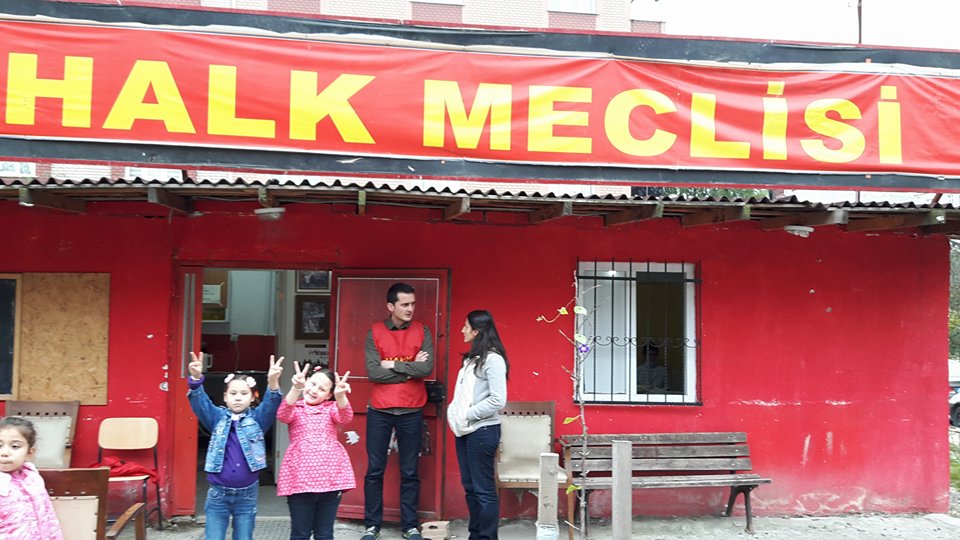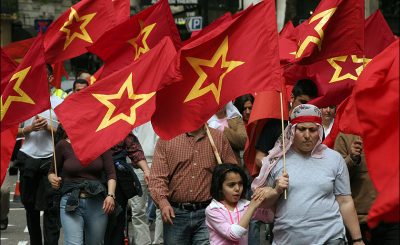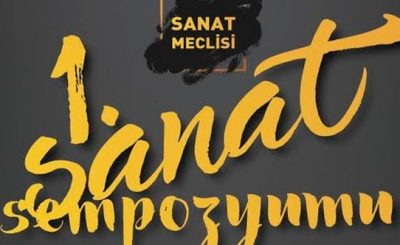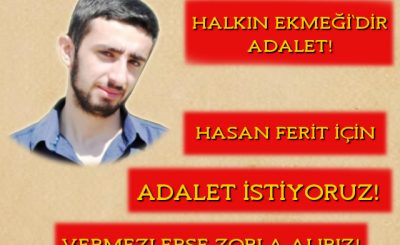A delegation from the Labour Party of Belgium (PTB) was in Gazi to join the March 12 commemoration. It was a militant march. It started with a couple of hundred people, but the group increased in size, and it kept growing to 10,000, 20,000 people. We passed the cemetery and slogans were shouted in front of the houses of the martyrs, and there were songs to commemorate the martyrs and in support of their families. Most of the people marched in the People’s Council’s part of the procession. They were carrying signs with the slogans: “Justice for the People! The Susurluk State will have to account to the people” They shouted the slogans of the Party-Front.
Everybody could see they were people from Gazi. They were their signs,their slogans, their people, their Cephe (“Front”). Even the Belgian friends, in
Turkey for the first time, could see this. At the end of the demonstration, there were groups from other parties, the PKK, MLKP and TIKB. They were masked, carrying huge flags bearing the symbols of their parties. A group of mothers were watching them. I asked: “Who are they?” They answered: “We don’t know. They’re not from here. They don’t have martyrs here.” It was like there were two demonstrations: the commemoration of the People’s Council and the Cephe, and the demonstration by the masked ones. This was not the right occasion to march among the groups who were wearing masks. The question is, who has roots among the people, and who does not.
The next day, we visited the cemetery. The tombstones of the young martyrs were surrounded by relatives who were crying and singing. We didn’t dare to take pictures. Deep in our hearts, we felt like tourists. Our chauffeur wouldn’t let us leave before we took some pictures. Before the families left, they brought us fruit and biscuits. We felt like tourists and this pained us. Of course, we had to take pictures. We couldn’t do anything about this in Belgium unless we had pictures. When we don’t share in their grief, we can’t share in their life and in their struggle.
I also met a new friend. Yusuf is a boy, slender, 11 years of age. He tried his best English, I tried my best Turkish. When he heard we were friends of the Cephe, we were allowed to put his flowers on the grave. He beamed when he said he was from the Cephe too. His slender body suddenly took the appearance of a guerrilla who was going to move mountains. The future of the Cephe is secure.
The reception of foreigners is always an impressive experience. We left Belgium with a few visits on our agenda because we didn’t want to be a burden to the families. But that’s not the way it works in Turkey. The protection and the hospitality is so warm, we just had to adjust to it. “The People’s Council told me to accompany you,” “the People’s Council told me to arrange transport for you.” We were protected like princesses, while our hosts took great risks for us. We stayed with the family of one of the martyrs. After we left, the police raided the house to punish them. We could not visit them anymore, but we were kept informed through our friends. We were called “tourists”. When we asked how we could get rid of that label, the answer was: “Come to Gazi. You’re friends of the Cephe, you are visiting us in solidarity and when you are here, you’re Cephe too.” We also did something concrete.
The Labour Party has 10 medical centres in Belgium, “Health Care for the People”. One of those wants to fraternise with the People’s Council and participated in our delegation. Initially we wanted to set up a support campaign to help the Health Committee of the People’s Council. But we saw that this was not enough, The People’s Council is a source of inspiration for our own work in Belgium, on how we can address the problems in our own neighbourhoods, how we can improve our work among the masses. We had school utensils with us for the children in Gazi. The girls of the Cultural Committee were very glad of these. For a time they had walked around with plans to set up a People’s School so the children can receive a good and affordable education. Hopefully it can start now permanently. If every foreign delegation from Belgium or Europe would take some things with them, there would be a constant supply. And we can explain in our country that these goods are meant for the People’s Council in Gazi. The girls of the Cultural Committee also asked if our youngsters were willing to come to Gazi this summer for a month to teach English to the youngsters of Gaz.
The organization of the People’s Councils also has another special meaning to us. For two years now, the resistance in Belgium is growing against the bosses and the government. There is the movement for jobs, against the child pornography networks, against racism. More and more, the state grows fascist, resembling the state model in Turkey. The people’s uprisings of a few months ago, when a Moroccan boy was shot dead by the police in Brussels, pose the question of how we are going to organise the movements of struggle and the people’s uprisings into one mass movement against the capitalist state. The masses are gaining self-confidence and the strength to take their fate into their own hands. They are organising to be victorious. That’s what we are learning from the People’s Councils and the Parti-Cephe who patiently do their revolutionary work to achieve victory.




